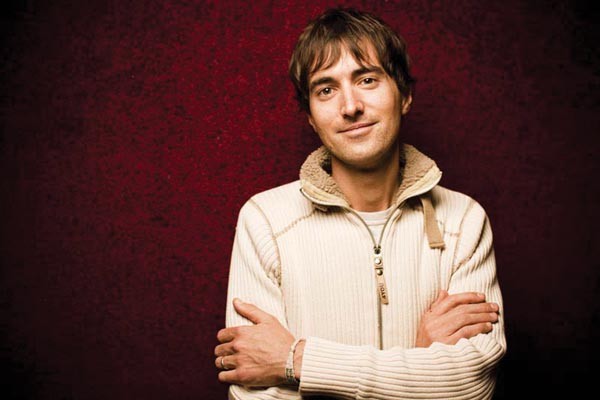DJs spinning electronically composed music from decks at the helm of a club space seem ubiquitous these days. They've also become staples at galleries, museums and even abandoned warehouses, if you know where and when to look. But for many classical-music audiences, the idea of electronic music had seemed foreign — until Mason Bates, the Pittsburgh Symphony Orchestra's Composer of the Year, introduced the concept to his teachers.
"I tended to just have to make the ideas work on their own," Bates says. "And it wasn't like an abstract concept, like I was trying to bring together these two worlds. It's more like [simply creating a] piece of music that has electronica rhythms in it. And the teachers of mine were generally a little bewildered at first. But once they saw the artistic terrain, they opened up and were pretty supportive."
Bates, who also was given a Heinz Award this year, grew up in Richmond, Va. in the '80s. Performative DJing wasn't exactly ubiquitous in that time and place. But when Bates got to New York for his undergraduate studies at Columbia and Juilliard, the world of complex sounds and interesting drum patterns opened up to him — right as he was getting into the heart of his classical studies. It was as if his traditional world was colliding with a whole new one. And rather than abandon one for the other, he decided to merge them.
"There's a lot that you can talk about when you are dealing with different kinds of music fusing together," he says. "You might think about how there could be world music intersecting with dance music — or there could be jazz intersecting with classical music — but it really comes down to the execution. So I think for composers who didn't understand what electronic music was, once they realized it wasn't like a crossover and that I was trying to bridge two spaces in a more meaningful way, they put down the resistance a little bit."
You could say what Bates does is revolutionary in the orchestral space. But his interest in composing lies more in seamlessly integrating the sounds than in disrupting the fluidity of a symphony. His goal is to create a deeper experience in an orchestral hall, and he does so by including beats from a drum pad in such a way that you feel it more than hear it. To him, it's just another step for the orchestra.
"The orchestra is one of the great inventions of mankind," Bates says. "It is such an interesting collaboration, in real time, of so many people. I think our generation kind of thinks of it as a museum piece. But the fact is, it's always evolved — whether it's adding gut strings in the 19th century or the percussion section expanding in the early 20th."
Still, to a younger audience, the orchestra may seem dated because of how rapidly the music played outside of the concert hall shifts. Internet-enabled music digestion, and the schizophrenic mixing abilities allowed by DJing equipment, may leave younger music consumers bored by the slow, dramatic movements of a symphony composition.
However, to Bates, grabbing that audience's attention is just a matter of education. At a time when orchestras are struggling to maintain subscribers, Bates' ideas could be some sort of saving grace for the historical traditions of western music.
"I long for the day when you go to an orchestral concert hall and the program book is, say, filmed. And it's interspersed between the pieces," Bates says. "It can be a more immersive experience. In an orchestral concert, there's a fair amount of dead space. I think there's a great opportunity there to make a kind of cinematic moment."
One of the most poetic testaments to multimedia integration with the symphony happened last year, when Bates performed his "The B-Sides" composition with the financially crippled Detroit Symphony Orchestra. The orchestra was forced to rethink a long-standing policy of not broadcasting its live performances; in the end, officials there decided to broadcast every one of them on the Internet.
Bates wrote an essay on the experience, part of which he regarded as "an homage" to the Detroit warehouse parties where techno was born.
"Performing ‘The B-Sides' in Detroit felt like a special homecoming — to a place I'd only visited aurally, in countless techno albums," he wrote. "Seeing and hearing this historic orchestra back in the game really gives me hope about the future of symphonic music in this country."
He takes that same maverick passion to every corner of his musical world. As a part of his residency with Pittsburgh Symphony Orchestra, he'll be performing as DJ Masonic along with PSO musicians as they stage his "Mercury Soul" at Static Lounge. (See sidebar, "Following Bates.") Merging tradition with contemporary entertainment, "Mercury Soul" is a statement on where electronic musical performance can go.
"I think that the performance end of electronic music is a great head-scratcher. We have all been to shows to see people we love and been disappointed," says Bates. "And it's a problem unique to electronic music because in some ways, some of the most interesting electronic music is stuff that can't be played; you get really fast drum and bass rhythms or something. That's part of the charm."
Aside from taking classical music into a space where the audience can mill around as if it were a rock show, "Mercury Soul" reaches for an above and beyond visual experience. The space is transformed as the program notes are projected onto the walls alongside art installations while the club's lights slowly shift colors for added aura.
DJing is rarely this dynamic, Bates concedes: "People just don't have the expectation because they're so used to pushing ‘Play.'"














